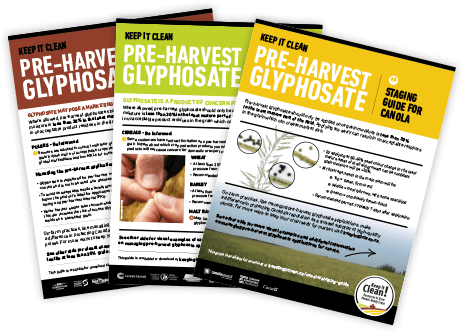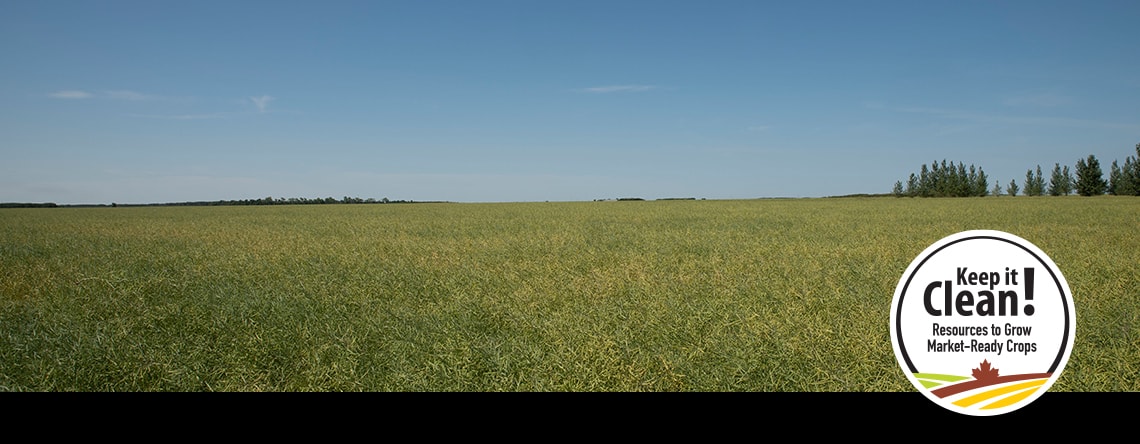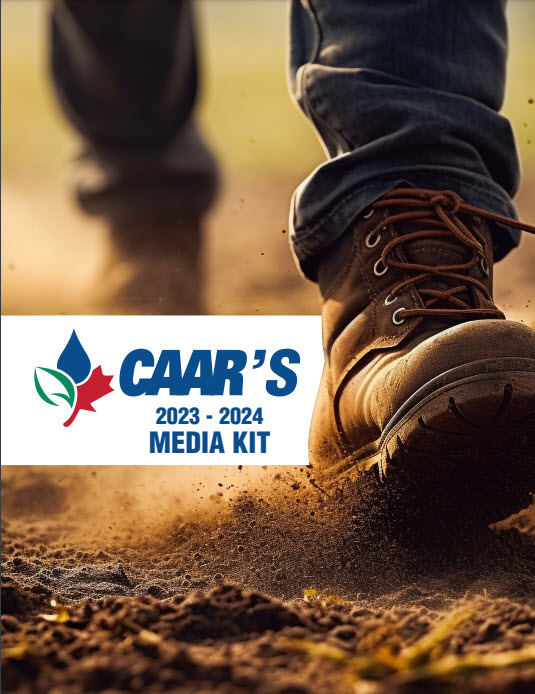Keep it Clean, a joint initiative of the Canola Council of Canada, Pulse Canada, Cereals Canada, the Barley Council of Canada and the Prairie Oat Growers Association, has developed a new advisor toolkit for Canadian ag retailers. The toolkit, which was mailed to CAAR retailer members in May, contains printed resources to inform and guide conversations about growing market-ready canola, pulse and cereal crops.
Greg Bartley, director of crop protection and crop quality at Pulse Canada, says a series of farmer focus groups held by Keep it Clean over the winter months helped identify the need for an advisor toolkit. 
“Farmers rely on their trusted advisors and buyers for information, so it only made sense to put together a toolkit just for them to get the Keep it Clean message out to farmers,” says Bartley. “We wanted to provide a resource that retailers could use as a “quick-hitter” – essentially, to get information about how to grow and maintain a market-ready crop out to their customers.”
Striking a Partnership
To ensure that the toolkits would meet the specific needs of advisors, Keep it Clean reached out to several ag retailers to see which resources would be most useful. Based on their feedback, the kits were created and a partnership with CAAR was struck to help distribute the kits to its membership. Bartley says it was CAAR’s good relationship with retailers that made it an obvious choice for a collaboration.
Mitch Rezansoff, CAAR’s executive director, says it was important for CAAR to be involved in the distribution of the toolkits because they recognize the role that retailers play as trusted advisors, and because of the importance of the Keep it Clean program itself.
“Keep it Clean falls directly within CAAR’s values and, as the only national association representing Canada’s ag retails, CAAR openly endorses the efforts of the program,” says Rezansoff. “Ag retailers and agronomists supporting the Keep it Clean message is in the best interest of farmers, processors and consumers, and it’s good for business.”
Based on retailer feedback, the toolkit contains information on products that could pose a market risk if applied to certain crops, Keep it Clean’s “5 Simple Tips” and a pre-harvest glyphosate staging guide.
Ag retailers and agronomists supporting the Keep it Clean message is in the best interest of farmers, processors and consumers, and it’s good for business.
One of the program’s most-requested items, the Keep it Clean Pre-Harvest Glyphosate Staging Guide provides information on pre-harvest glyphosate application and includes visual examples of canola, pulse and cereal crops at the correct stage to receive an application – less than 30 percent grain moisture. As this can often be challenging for growers to assess, retailers can use the double-sided handout as a visual reference and to support the advice they provide to growers.
“The toolkit is just a simple package that retailers and agronomists can use to help communicate these important messages to growers,” says Bartley. “We’ve created these handouts and laminated them to make them more easily available. You can keep a hard copy of the material in your truck and always have it available to have a conversation with farmers.”
Online Resources for Retailers
Retailers are also granted access to a special advisor’s page at keepingitclean.ca/advisors where they can download PDFs of the toolkit resources, as well as sharable articles for their e-newsletters, blogs and social media channels on topics such as fusarium and blackleg management, pre-harvest glyphosate use and safe storage.
“The online tools can easily be put into an email news blast to quickly get information out to growers,” says Bartley. “Whether it’s the 5 Simple Tips to keep crops ready for market, or the products of concern and MRL advisories, we hope that the resources are valuable to retailers and provide a good basis to have these conversations with farmers. We encourage retailers to check the page regularly for updates to share with their customers.”
Playing an Important Role
Both Bartley and Rezansoff emphasize the need to take a value-chain approach to ensuring farmers are producing crops that are acceptable to both domestic and export customers.
Rezansoff’s advice to retailers is to make sure all staff are utilizing the resources provided by Keep it Clean in their day-to-day dealings with growers. By doing so, they can help their grower customers protect their investments and help uphold Canada’s reputation as a supplier of high-quality canola, pulses and cereals.
“Retails, and in particular agronomists, are our frontline of messaging to farmers to ensure products, rates and timing are within label and consumer safety recommendations,” says Rezansoff, adding that maintaining consistent information is vital. “Misapplication of products can have lasting impacts to Canada’s reputation of providing safe, high-quality food. We need a consistent message across the entire ag industry in Canada and we all have a role to play.”
Download Keep it Clean toolkit materials at keepingitclean.ca/advisors.
Related Articles
- Gathering Retailer Members’ Input Canadian Association of Agri-Retailers (CAAR) has extended its Retailer Member Survey to Jan. 15, 2021, giving members additional time to express their opinions on how CAAR can improve the services it offers and iden...
- Reaching Out to Retailers In October 2020, the Canadian Association of Agri-Retailers (CAAR) launched an online member survey tailored exclusively to the retail members of the association. Click here to complete the survey and provide your in...
- Evolution in Canadian Fertilizer CAAR was proud to represent retailers during three days of meetings on the future of registration, regulation and use of fertilizer products in Canada. Retail Industry Takes a Seat at the Discussion Table CAAR wa...
- Taking the Lead with NH3 CAAR has helped members weather regulatory changes for 25 years. When the members of the Western Fertilizer and Chemical Dealers Association (WFCDA) voted to form a national organization, they sought to achieve more...
- Reaching the Right Balance CAAR helped set the course for a domestic pesticide use policy that balances innovation and market access. CAAR continues to represent ag retailers on the Canada Grains Council’s (CGC) MRL Policy Steering Committe...
 How to resolve AdBlock issue?
How to resolve AdBlock issue? 


Join the discussion...
You must be logged in as a CAAR member to comment.
Report
My comments